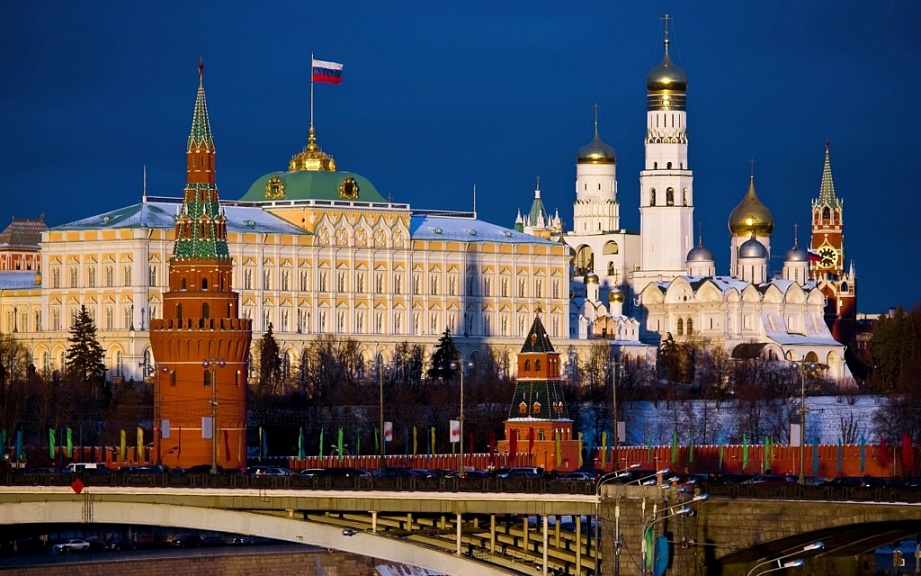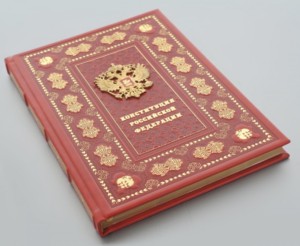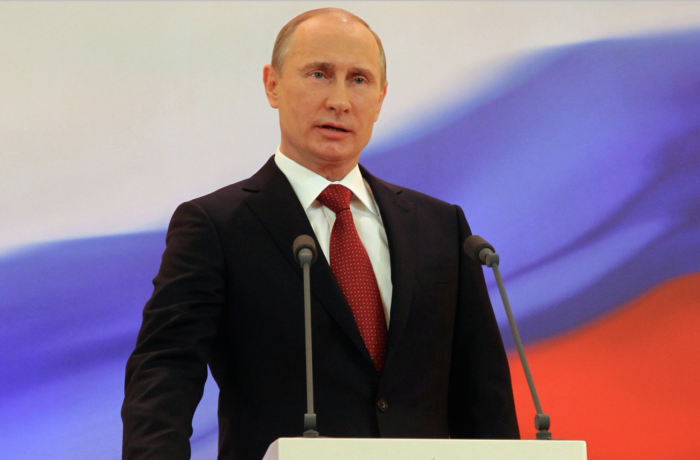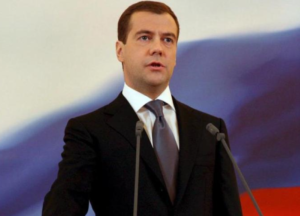Political System
State

Russia is a democratic federal state with a republican form of government. The legislative body of the Russian Federation is the bicameral Federal Assembly (the Council of Federation and the State Duma). The Council of Federation consists of representatives of each federal entity. The deputies of the State Duma are elected for a term of 5 years from party lists by proportion of the votes that each party receives nationwide.
The Head of State is the President of the Russian Federation, who is also the Supreme Commander-in-Chief of the Armed Forces. The President is elected by citizens of Russia by direct secret ballot for a term of 6 years. Vladimir V.Putin was elected President on March 4, 2012.
The executive power is exercised by the Government of the Russian Federation. The Chairman of the Government is appointed by the President with the consent of the State Duma. The Russian Federation consists of 85 federal entities (republics, territories and regions), including the cities of Moscow, St.Petersburg, and Sevastopol. Moscow is the capital of Russia.
Constitution

The Constitution of the Russian Federation was adopted on December 12, 1993. The adoption of the 1993 Constitution marked the beginning of a new era in the history of Russian statehood.
The Constitution forms the country’s legal foundation, proclaims the President of the Russian Federation the head of state and lays upon him the responsibility for defending the Constitution, human rights and civil liberties, safeguarding Russia’s sovereignty, independence and territorial integrity, and ensuring the coordinated functioning and cooperation of the state bodies of power. Full Text.
President

The President of the Russian Federation is the head of state, Supreme Commander-in-chief and holder of the highest office within the Russian Federation. However, he is not the head of the executive branch. The Government of Russia is the highest organ of executive power. The current President of Russia is Vladimir Putin.
As the guarantor of the Constitution and the entire system of constitutional law, the President ensures that the constitutions, laws and regulations of the constituent territories of the Russian Federation be in full compliance with the Constitution and federal laws.
The President is highly active in appointing top officials in the country. He nominates candidates for official state positions, who must ultimately be appointed based on parliamentary vote. The President submits nominations to the Federation Council, the upper house of the parliament, for judges of the Constitutional Court, the Supreme Court and the Supreme Arbitration Court, as well as for Prosecutor General of Russia. The President submits to the State Duma, the lower house of parliament, nominations for appointment to the office of the Chairman of the Central Bank, and submits to the State Duma any proposal to relieve the Chairman of the Central Bank of his duties.
Under the procedure stipulated by the Constitution, the President exercises his right to submit draft legislation, as well as the right to sign bills into law or to veto them. The President has the right to suspend laws and regulations issued by executive bodies of Russia’s constituent territories if such laws and regulations contravene the Constitution, federal laws or international obligations of the Russian Federation, or violate human and civil rights and liberties, pending the resolution of the issue in an appropriate court. The president is further empowered to grant federal pardons and reprieves, and to convene and adjourn either or both houses of the Federal Assembly under extraordinary circumstances. Other powers of the President in the sphere of legal activities and in his interaction with the Parliament include calling elections to the State Duma, dissolving the State Duma in certain cases, and calling referendum.
Under the Constitution, the President is not empowered to determine the full range of short-, middle-, and long-term objectives and targets of domestic policy, but only its basic guidelines. They are to be implemented both by the President himself and by the Government of Russia within the bounds of their authority. The President’ fundamental positions on domestic policy issues are expressed in his written decisions regarding draft federal constitutional laws and draft federal laws, as well as his letters explaining the reasons for rejecting draft federal laws.
Within the bounds of the authority granted to the head of state by the Constitution and other laws, the President also shapes the basic domestic policy guidelines by issuing legal regulations and through organizational and regulatory activity, such as issuing decrees and executive orders. Each year the President is required to make an Address to the Federal Assembly regarding the situation in the country and the internal and foreign policy of the state.
The President is invested with extensive rights to implement the state’s foreign policy. The President determines Russia’s position in international affairs and represents the state in international relations, conducts negotiations and signs ratification documents. The President appoints and recalls diplomatic representatives of Russia to foreign states and international organizations. These appointments are preceded by consultations with the respective committees or commissions of the two houses of the Federal Assembly. The President signs international treaties.
Government

The government exercises executive power in the Russian Federation. The members of the government are the prime minister, the deputy prime ministers, and the federal ministers. It has its legal basis in the Constitution of the Russian Federation and the federal constitutional law “On the Government of the Russian Federation.”
The prime minister is appointed by the president of the Russian Federation and confirmed by the State Duma. He or she succeeds to the presidency if the current president dies, is incapacitated or resigns. The current prime minister is Dmitry Medvedev.
The government issues its acts in the way of decisions and orders . These must not contradict the constitution, constitutional laws, federal laws, and Presidential decrees, and are signed by the Prime Minister.
The government is the subject of the 6th chapter of the Constitution of the Russian Federation. According to the constitution, the government of the Russian Federation must:
- draft and submit the federal budget to the State Duma; ensure the implementation of the budget and report on its implementation to the State Duma;
- ensure the implementation of a uniform financial, credit and monetary policy in the Russian Federation ;
- ensure the implementation of a uniform state policy in the areas of culture, science, education, health protection, social security and ecology;
- manage federal property;
- adopt measures to ensure the country’s defence, state security, and the implementation of the foreign policy of the Russian Federation;
- implement measures to ensure the rule of law, human rights and freedoms, the protection of property and public order, and crime control;
- exercise any other powers vested in it by the Constitution of the Russian Federation, federal laws and presidential decrees.
Federal Assembly
The Federal Assembly is the national legislature of the Russian Federation. It consists of the State Duma, which is the lower house, and the Federation Council, which is the upper house. Both houses are located in Moscow. The Chairman of the Federation Council is the third important position after the President and the Prime Minister.
The jurisdiction of the State Duma includes: consent to the appointment of the Chairman of the Government, deciding the issue of confidence in the Government, appointment and dismissal of the Chairman of the Central Bank, appointment and dismissal of the Chairman and half of the auditors of the Accounting Chamber, appointment and dismissal of the Commissioner for human rights, proclamation of amnesty, advancing of charges against the President for his impeachment and others.
The jurisdiction of the Council of the Federation includes: approval of changes in borders between subjects of the Russian Federation, approval of the decree of the President on the introduction of a martial law or on the introduction of a state of emergency, deciding on the possibility of using the Armed Forces of Russia outside the territory of the Russia, appointment of elections of the President, impeachment of the President, appointment of judges of higher courts of Russia, appointment and dismissal of the Procurator-General of the Russian Federation, appointment and dismissal of Deputy Chairman and half of the auditors of the all Accounting Chamber and others.
As the Russian legislature, all laws must be voted in the Federal Assembly before they are signed into law. All bills, even those proposed by the Federation Council, must first be considered by the State Duma. Upon adoption by a majority of the full State Duma membership, a draft law is considered by the Federation Council, which has fourteen days to place the bill on its calendar. The Federation Council cannot make changes in bills passed by the Duma and can either approve or reject them. If the Federation Council rejects a bill passed by the State Duma, the two chambers may form a conciliation commission to work out a compromise version of the legislation. If two chambers cannot reach a compromise, or the Duma insists on passing the bill as is, the veto of the Federation Council can be overridden, if two thirds of the Duma’s constitutional composition vote in favor of the bill.
The State Duma and the Federation Council usually meet separately. Joint sessions are organized when the President of Russia delivers his annual address to the Federal Assembly and in some other very rare occasions.
